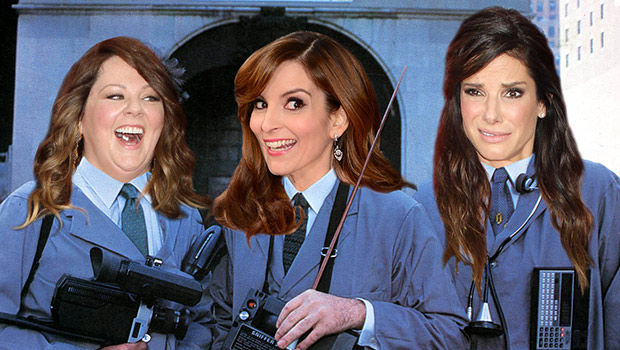Genre: TV Pilot – Sci-fi Comedy
Premise: In the early 22nd century, when space travel is commonplace, a young ship commander accidentally flies his crew into a parallel dimension.
About: Paul Feig (Bridesmaids, The Heat) is one of the new faces for Yahoo’s recent infatuation with comedy half-hours. Yahoo and Amazon are looking for ways to differentiate themselves from the Netflix original programming dynasty and since Netflix loves its one hour dramas, the two media giants are going after comedy instead. Feig, who started in TV with the universally acclaimed “Freaks and Geeks,” a show that’s spawned every comedic actor working right now who didn’t come out of SNL, is coming back to television with Other Space, a show he originally conceived of ten years ago. That’s the draft I’m going to be reviewing today, the old one. Let’s check it out, yo.
Writer: Paul Feig
Details: 50 pages (but it’s in that old TV format where everything is double-spaced) – 1/12/04 draft
 This would probably be the best female Ghosbusters trio
This would probably be the best female Ghosbusters trio
If you’re anything like me, you’re equal parts intrigued, worried, skeptical, and fascinated by this whole “All-Female” Ghostbusters thing Paul Feig is putting together. It has the potential to be really funny or REALLY bad. I mean, if the only reason you have an all female Ghosbusters team is because a director is really good with female actors, might that not be the best way to approach a story?
Isn’t the idea of a storytelling to grow ideas organically? Not because you’re trying to meet some mandate that will allow the movie to get a green light? Then you tack on this whole thing about how the previous Ghostbusters installments never happened, and we’re in hot slime. That’s a very curious position to take. You’re erasing from the archives some of the most lovable characters in cinema history. Is your core audience really going to be okay with that?
And how do you even begin to explain an all-female Ghostubsters team in a script? Are they going to have a sign on the front door that says, “Female applicants only?” What would be the logic in eliminating males from becoming Ghostbusters? I suppose you can write it in that the three main characters are friends from graduate school, just like the original Ghostbusters, but this setup is already feeling a mite forced.
I wouldn’t be surprised if, at some point, Feig said, “Uhhh, nothing about this feels natural,” and they ditch it again. Why does this project have to be so complicated? Make it so that, since 1989, the old Ghostbusters cleaned up the ghost problem in New York so that nobody’s seen a ghost in 25 years. But recently, a couple have been spotted, and some new Ghostbusters bring the old business back to life? People aren’t clamoring for a world-class set-up to a story about taking down ghosts. Just get us to some ghosts wreaking havoc and let’s have some fun!
And you know what, I like Feig as the director of an all-female OR all-male Ghostbusters reboot. I thought Bridesmaids was hilarious. The Heat was a perfectly conceived concept with some funny moments. This guy knows funny and seems to have the sensibilities to take on this project. But you can’t put the vice grip on this. Let the story breathe and don’t limit yourself. Here’s to hoping his pilot does the same…
Stewart Lipinsky may only be 21 years old, but he’s an ace with a star ship, and nails the toughest space simulator test the Space Federation’s got, the “surprise asteroid” test (all he had to do was run a fuel clean-out burst through the forward venting tubes). This allows Stewart to win command of his very own star ship, the USS Cruiser!
This would be wonderful if the rest of Stewart’s crew wasn’t so miserable. There’s his 24 year old sister, Karen, who’s pissed off that SHE’S not the new captain. There’s Navigator Tina, Stewart’s secret crush, who’s bummed out that she’s leaving her boyfriend. There’s best friend Michael, who’s upset HE didn’t win the captain position. And then there’s Kent, the allergy ridden science advisor who’s dad forced him to take this position.
As the crew heads out on their first deep space trip and Stewart tries to pump up crew morale, they accidentally float through a ripped pocket of the space-time continuum. It doesn’t take them long to realize they’re in a whole new dimension now where the laws of their previous universe don’t apply anymore.
In fact, the miserable crew all of a sudden starts being really nice to Stewart, encouraging him to celebrate this unheralded discovery by opening up all the air locks. Opening up all the air locks? That doesn’t sound right. Stewart snaps out of it and realizes that some sort of evil amoeba has slipped into the ship, creating a bunch of illusions in order to trick the crew into killing themselves!
This is the new universe they live in, one where they’ll have to adapt quickly if they plan to survive. And while it kind of sucks that they’re stuck here, they figure as long as they are, they might as well fly around and document it all in the unlikely event that they find a way back to their universe. And that, my friends, is our pilot.
I’ll tell you what I was hoping this wasn’t going to be. I was hoping it wasn’t going to be some uber Star Trek geek’s excuse to geek out about Star Trek scenarios for 30 minutes a week. So what happens in the very first scene? Stewart pops up from behind his command chair holding a metal Star Trek pin. “I found my Star Trek pin,” he says. “My dad would have killed me if I lost this.”
Oh boy.
I’ve made the disclaimer hundreds of times before that comedy is subjective, but I’m not sure anyone’s going to disagree on this one. There isn’t anything funny here. There are some amusing moments. There are some smiles to be had. But I’m not sure a single joke landed. When General Malarky confirms to Karen, Stewart’s sister, that he’ll get to be captain over her, her response is, “Permission to kill myself, sir.” Yeah, I smiled. But haven’t I seen that line uttered 10 billion times already? That’s the level of humor to expect here. Very middle-of-the-road safe stuff.
Which is fine if you’re writing a sitcom for CBS. Some might even argue it’s REQUIRED to write a sitcom for CBS. But this is Yahoo man! This is the internet! The place where you need not worry about crusty old men in suits questioning every joke. You get to take chances. Of course, Past Paul Feig did not know that Future Paul Feig would sell this to Yahoo in 10 years. I’m not even sure there was a Yahoo ten years ago. So I’ll give him a pass on that. But I won’t give him a pass on the safety of these jokes.
Now I don’t usually review half-hour pilots on the site, but an eye-popping number arrived on my internet this weekend which I’ve been unable to forget since. Did you guys know that The Big Bang Theory is worth 2.5 billion dollars! Not a typo. B. Bee. Beeeeeeee. Beeeeeeee-illion. That’s gotta mean that shows like say, Community, which get 1/4 or 1/5 the ratings are work HALF A BILLION dollars, right? Half a billion dollars for a 1.5 rating?? Sign me up! If you’ve got a good comedy idea, you should definitely be writing yourself a half-hour comedy show.
This brings up a question I’ve been battling with lately as far as the TV world. With SO MANY places to sell to these days, and with each of those places being so different (some need commercial breaks, some don’t, some have time constraints, some don’t, some want a 10 episode season, some 24, some are safe networks, some are riskier), how do you know how to write your pilot anymore? I’d write a CBS sit-com completely differently than I’d write an HBO sitcom. But then am I limiting myself? Should I split the difference? With movies you just write what you want to write. Ironically, TV shows, which are supposed to give you so much more freedom, are becoming harder and harder to tab with all these options. Maybe you TV experts can help me out. This industry is changing so darn fast, I can’t keep up with it, even when I’m hanging on to the tail of the USS Cruiser.
[ ] what the hell did I just read?
[x] wasn’t for me
[ ] worth the read
[ ] impressive
[ ] genius
What I learned: If you have a wild premise, you can’t deliver a safe execution. If you’re going to rev up our expectations with a show about a space crew that gets lost in another dimension, you can’t be delivering standard jokes like: “Permission to kill myself, sir.” You’ve made a promise to the reader that you’re going to do something unique. Playing it safe with the execution is breaking that promise.


